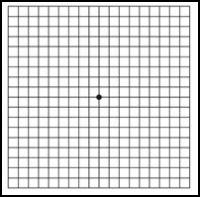Simple Home Test Detects Leading Cause of Blindness
MEDIA RELEASE
MAY 2013
Simple Home Test Detects Leading Cause of Blindness
MACULAR DEGENERATION AWARENESS WEEK
Taking place this week is Macular Degeneration Awareness Week – a nationwide campaign that aims to educate Kiwis about the leading cause of blindness in New Zealand, macular degeneration (MD).
MD is a chronic eye disease that affects the central vision and one in seven New Zealanders over the age of 50 have it. By 2030, incidence levels are expected to increase by 70 per cent.* Treatment is available for Wet MD but only if it is diagnosed at an early stage.
Celebrity sufferers include British actress, Dame Judi Dench who is currently having treatment to slow progression of the disease. Early detection is vital to identify if treatment is appropriate.
To make people aware of the importance of early detection, Macular Degeneration New Zealand (MDNZ), the charity behind the Awareness Week, is encouraging Kiwis across the country who are aged over 50 to have their macular checked. A simple sight test from the confines of their own home may help identify early signs.
Using the Amsler Grid below, anyone can take this quick and easy test to instantly reveal whether they have a macular problem. MDNZ believe this simple test has the potential to help thousands who may be at risk and not know about it.

The Amsler Grid
Macular Degeneration Test
If you wear reading
glasses or contact lenses do not remove them for this
test.
1. Hold the grid at a
comfortable reading distance (approx. 33cm) in a well-lit
room.
2. Cover one eye with
your hand and focus on the centre dot with your uncovered
eye. Repeat with the other eye.
3.
If you notice any wave, broken or distorted lines,
blurring or gaps in the grid, you may have a macular
problem and should see an eye care specialist.
Backing the Awareness Week in New Zealand, are Sir Colin Meads and Sir Peter Leitch – both of whom are considered to be ‘at risk’ of MD due to age.
Sir Colin Meads, a Macular Degeneration NZ Ambassador and All Black legend, says: “The facts and figures surrounding macular degeneration speak volumes and even with there being so many people affected by the condition, it’s still relatively unheard of if you speak to Mr. Joe Bloggs on the street”.
“Being at the age I am at, I know I could easily be one of those at risk – and this really hits home. This is why I’m keen to raise as much awareness possible surrounding macular degeneration as early detection is key”.
“The Amsler Grid is great! It’s simple and easy to do – there’s no reason why someone shouldn’t do it when you think about the bigger picture.”
Dr Dianne Sharp, Ophthalmologist and Chairperson of MDNZ, says: “Macular degeneration affects so many people in New Zealand and we’ve made it our mission to raise awareness of the disease by creating Macular Degeneration Awareness Week.
“Those at high risk of developing macular degeneration, include people over the age of 50, smokers and people with a family history of macular degeneration. Early detection and a healthy diet and lifestyle can slow down the disease’s progression, massively”.
“We’re urging everyone to take the test!”
There are two types of MD: “wet” (sudden) and “dry” (progressive). While there are effective treatments for wet MD, early detection is vital, as some people still experience a significant loss of vision, and for people with dry MD, there is no treatment. There is no “cure” for either type, but diet and lifestyle may modify risks. The emotional, social and economic impact of quality of life from visual impairment can be severe, so as much awareness as possible is needed to change the statistics in New Zealand.
The Amsler Grid, additional support and information is available on www.mdnz.co.nz
ENDS


 Bowls New Zealand: Lawson And Grantham Qualify To Keep Bowls Three-Peat Hopes Alive
Bowls New Zealand: Lawson And Grantham Qualify To Keep Bowls Three-Peat Hopes Alive Te Whatu Ora Health NZ: Health Warning – Unsafe Recreational Water Quality At South Bay And Peketā Beaches And Kahutara River Upstream Of SH1
Te Whatu Ora Health NZ: Health Warning – Unsafe Recreational Water Quality At South Bay And Peketā Beaches And Kahutara River Upstream Of SH1 Wikimedia Aotearoa NZ: Wikipedian At Large Sets Sights On Banks Peninsula
Wikimedia Aotearoa NZ: Wikipedian At Large Sets Sights On Banks Peninsula Water Safety New Zealand: Don’t Drink And Dive
Water Safety New Zealand: Don’t Drink And Dive NZ Olympic Committee: Lydia Ko Awarded Lonsdale Cup For 2024
NZ Olympic Committee: Lydia Ko Awarded Lonsdale Cup For 2024 BNZ Breakers: BNZ Breakers Beaten By Tasmania Jackjumpers On Christmas Night
BNZ Breakers: BNZ Breakers Beaten By Tasmania Jackjumpers On Christmas Night
